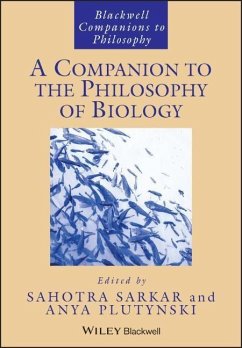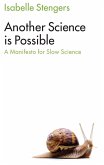Comprised of essays by top scholars in the field, this volume offers detailed overviews of philosophical issues raised by biology.
Brings together a team of eminent scholars to explore the philosophical issues raised by biology
Addresses traditional and emerging topics, spanning molecular biology and genetics, evolution, developmental biology, immunology, ecology, mind and behaviour, neuroscience, and experimentation
Begins with a thorough introduction to the field
Goes beyond previous treatments that focused only on evolution to give equal attention to other areas, such as molecular and developmental biology
Represents both an authoritative guide to philosophy of biology, and an accessible reference work for anyone seeking to learn about this rapidly-changing field
Brings together a team of eminent scholars to explore the philosophical issues raised by biology
Addresses traditional and emerging topics, spanning molecular biology and genetics, evolution, developmental biology, immunology, ecology, mind and behaviour, neuroscience, and experimentation
Begins with a thorough introduction to the field
Goes beyond previous treatments that focused only on evolution to give equal attention to other areas, such as molecular and developmental biology
Represents both an authoritative guide to philosophy of biology, and an accessible reference work for anyone seeking to learn about this rapidly-changing field
"Many of the discussions here start with a definition of terms and a historical context of the subject before delving into the deeper philosophical issues, making it a useful reference for students of biology as well as philosophy." -- Northeastern Naturalist, April 2008
"The topics that are addressed are done so well. This book will appeal to the advanced student and knowledgeable amateur and may prove useful catalyst for discussion among research teams or those engaged in cross-disciplinary studies." -- Reference Reviews, February 2009
"Sarkar and Plutynski have compiled a series of essays about the philosophical implications of traditional and emergent biological studies. Among the areas discussed are genetics, immunology and evolutionary psychology." -- Columbia College Today Alumni Magazine, February 2009
"A Companion to the Philosophy of Biology will be a very useful guide not only for philosophers but also for historians, sociologists and biologists. Its greatest asset is that it expands beyond the scope of recently published textbooks in philosophy of biology by including a detailed treatment of philosophical aspects of medicine, ecology, mind and behavior and that it places the themes in their historic context. The diversity of areas covered will appeal to students of general interest as well as specialists. Especially helpful is that most chapters end with an extended 'Reference' and often an additional 'Further reading' section that will allow readers to research the individual topics in greater depth." -- Metapsychology Reviews Online
"The book is similar to, though different enough to distinguish itself from, its closest kin, The Oxford Handbook of the Philosophy of Biology, edited by Michael Ruse (2008), and The Cambridge Companion to the Philosophy of Biology, edited by David Hull and Michael Ruse. They do not offer essays on language, biodiversity, or models, which are included in the present volume. Recommended." -- Choice, November 2008)
"The topics that are addressed are done so well. This book will appeal to the advanced student and knowledgeable amateur and may prove useful catalyst for discussion among research teams or those engaged in cross-disciplinary studies." -- Reference Reviews, February 2009
"Sarkar and Plutynski have compiled a series of essays about the philosophical implications of traditional and emergent biological studies. Among the areas discussed are genetics, immunology and evolutionary psychology." -- Columbia College Today Alumni Magazine, February 2009
"A Companion to the Philosophy of Biology will be a very useful guide not only for philosophers but also for historians, sociologists and biologists. Its greatest asset is that it expands beyond the scope of recently published textbooks in philosophy of biology by including a detailed treatment of philosophical aspects of medicine, ecology, mind and behavior and that it places the themes in their historic context. The diversity of areas covered will appeal to students of general interest as well as specialists. Especially helpful is that most chapters end with an extended 'Reference' and often an additional 'Further reading' section that will allow readers to research the individual topics in greater depth." -- Metapsychology Reviews Online
"The book is similar to, though different enough to distinguish itself from, its closest kin, The Oxford Handbook of the Philosophy of Biology, edited by Michael Ruse (2008), and The Cambridge Companion to the Philosophy of Biology, edited by David Hull and Michael Ruse. They do not offer essays on language, biodiversity, or models, which are included in the present volume. Recommended." -- Choice, November 2008)
"This book is a companion to the philosophy of biology, and it not only should be of interest to scholars in philosophy of biology, but it also may be utilized by classroom educators teaching courses in philosophy of biology, theoretical biology, and evolutionary theory." (Science & Education, April 2010)
"Many of the discussions here start with a definition of terms and a historical context of the subject before delving into the deeper philosophical issues, making it a useful reference for students of biology as well as philosophy." (Northeastern Naturalist, April 2008)
"The topics that are addressed are done so well. This book will appeal to the advanced student and knowledgeable amateur and may prove useful catalyst for discussion among research teams or those engaged in cross-disciplinary studies." (Reference Reviews, February 2009)
"Sarkar and Plutynski have compiled a series of essays about the philosophical implications of traditional and emergent biological studies. Among the areas discussed are genetics, immunology and evolutionary psychology." (Columbia College Today Alumni Magazine, February 2009)
"A Companion to the Philosophy of Biology will be a very useful guide not only for philosophers but also for historians, sociologists and biologists. Its greatest asset is that it expands beyond the scope of recently published textbooks in philosophy of biology by including a detailed treatment of philosophical aspects of medicine, ecology, mind and behavior and that it places the themes in their historic context. The diversity of areas covered will appeal to students of general interest as well as specialists. Especially helpful is that most chapters end with an extended 'Reference' and often an additional 'Further reading' section that will allow readers to research the individual topics in greater depth." (Metapsychology Reviews Online)
"The book is similar to, though different enough to distinguish itself from, its closest kin, The Oxford Handbook of the Philosophy of Biology, edited by Michael Ruse (2008), and The Cambridge Companion to the Philosophy of Biology, edited by David Hull and Michael Ruse. They do not offer essays on language, biodiversity, or models, which are included in the present volume. Recommended." (Choice, November 2008)
"Many of the discussions here start with a definition of terms and a historical context of the subject before delving into the deeper philosophical issues, making it a useful reference for students of biology as well as philosophy." (Northeastern Naturalist, April 2008)
"The topics that are addressed are done so well. This book will appeal to the advanced student and knowledgeable amateur and may prove useful catalyst for discussion among research teams or those engaged in cross-disciplinary studies." (Reference Reviews, February 2009)
"Sarkar and Plutynski have compiled a series of essays about the philosophical implications of traditional and emergent biological studies. Among the areas discussed are genetics, immunology and evolutionary psychology." (Columbia College Today Alumni Magazine, February 2009)
"A Companion to the Philosophy of Biology will be a very useful guide not only for philosophers but also for historians, sociologists and biologists. Its greatest asset is that it expands beyond the scope of recently published textbooks in philosophy of biology by including a detailed treatment of philosophical aspects of medicine, ecology, mind and behavior and that it places the themes in their historic context. The diversity of areas covered will appeal to students of general interest as well as specialists. Especially helpful is that most chapters end with an extended 'Reference' and often an additional 'Further reading' section that will allow readers to research the individual topics in greater depth." (Metapsychology Reviews Online)
"The book is similar to, though different enough to distinguish itself from, its closest kin, The Oxford Handbook of the Philosophy of Biology, edited by Michael Ruse (2008), and The Cambridge Companion to the Philosophy of Biology, edited by David Hull and Michael Ruse. They do not offer essays on language, biodiversity, or models, which are included in the present volume. Recommended." (Choice, November 2008)








